Chef Izu Ani likes to joke about. But while he clearly thrives at the centre of attention—often peppering his regular clientele with his cheeky sense of humour—what he says is rarely throw away.
“Life is about making the small things seem bigger,” Ani says before raising an eyebrow and bursting into laughter. But as quick as he starts laughing, he stops and expands on the statement: “but, seriously, like, if you only have a small restaurant space, you have to try and make it feel large in reputation.”
Despite the tongue-in-cheek element to it, the point is a poignant one, particularly coming from him. ‘Chef Izu’ is often referred to as Dubai’s first ‘homegrown’ celebrity chef thanks to his immense charisma and a growing empire of restaurants and concepts that he has built-up in the emirate.
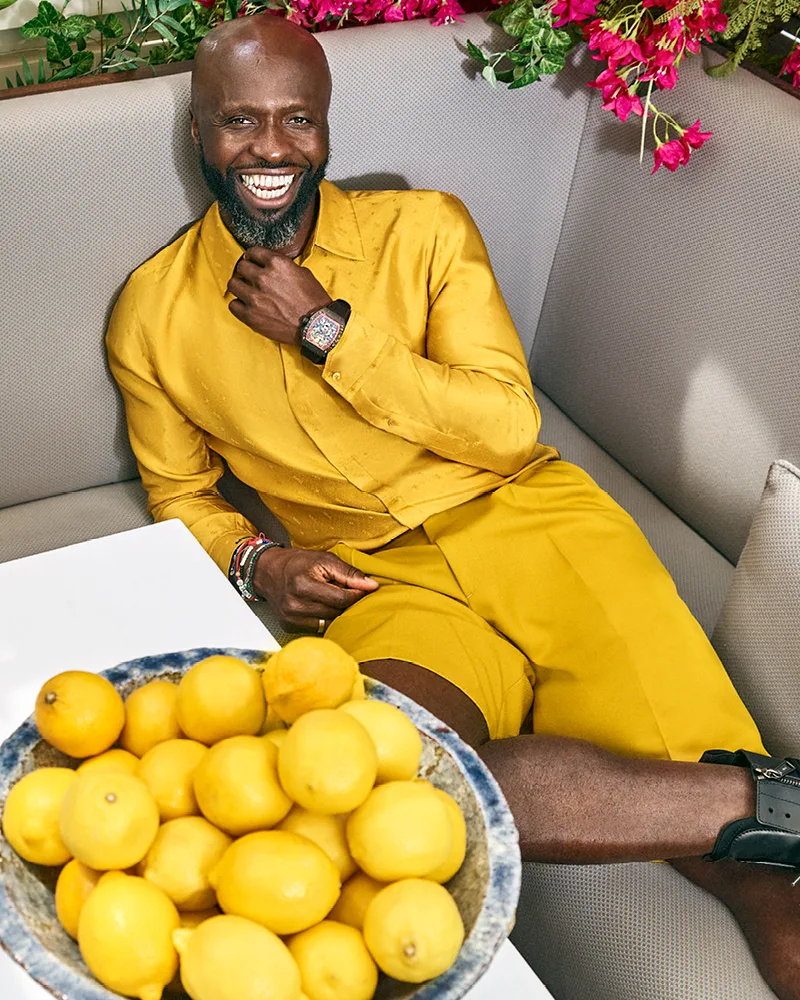
To further make his point he picks up a couple of lemons from the bowl beside him and holds them up. “These are just simple lemons, but if you really spend the time and care into the provenance of them, selecting the right ones, understanding how to best use them, then you can turn something so simple into something extraordinary,” he says, before pausing and blurting out “Now, how many of these do you think I can put in my mouth?!”
His antics are aimed at the Esquire crew assembled in his restaurant, Gaia, in the heart of Dubai’s financial district. The lemons, in this case, are being used as both a prop for a photoshoot and a metaphor. We are witnessing a very pure concentration of Chef Izu. The jokes are flowing, the energy on-set is effervescent and it is all being fueled by his mega-watt smile.
The restaurant has a similar type of energy. It is a weekday, just after midday, and the lunchtime rush is starting to bubble to a boil. There is a steady mix of white-shirted businessmen and impeccably dressed locals streaming through the doors.
“If you really spend the time and care understanding how to best use produce, then you can turn something so simple into something extraordinary,”
One chic looking lady, who is hosting a birthday lunch, notices Chef Izu and comes over to say hi. “Hey superstar!” she calls. He laughs and they exchange cheek kisses. She is a regular and clearly revels in her personal relationship with the one of the most notable chefs in town. But don’t we all. DIFC is the undeniable heart of Dubai’s high-end dining scene, and in Gaia, Chef Izu runs one of the most in-demand restaurants.
To be friends with Chef Izu is a sign that you roll in a particularly well-set crowd. “People just can’t get enough of me!” he says to the lady. “Don’t worry, I’ll make sure you are well taken care of. I hope you have a great birthday!” The jokes and the details. It is Izu Ani at his peak.
***
Away from the restaurant floor Ani is someone who has a very clear understanding of life and what he wants from it. When he talks about what he values—time, family, health and food— he talks in absolutes.
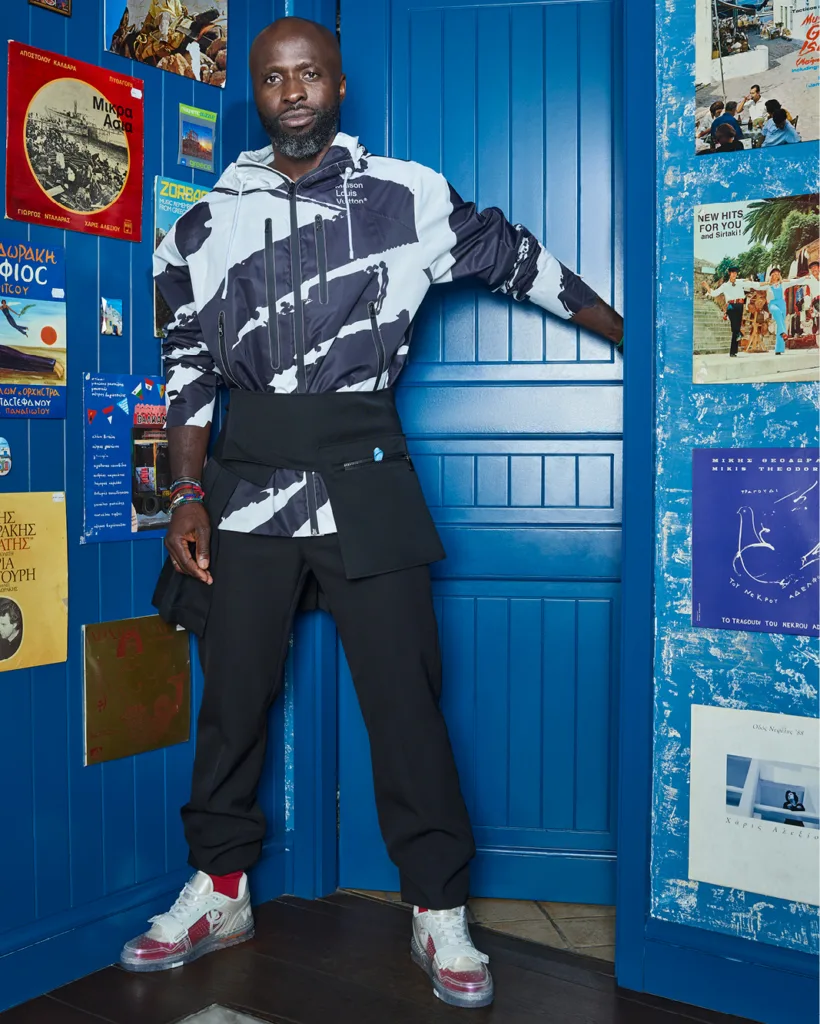
It comes as a bit of a surprise to find out that he is not much of a reader, as a lot of his reasoning sounds like it has been hand-picked from recent genre-defining leadership and management books. It’s not that he doesn’t like reading, it’s that Ani has always found that there is no better form of learning than experience. He is a learn-by-doing kind of guy.
Born in Nigeria and raised in London, Ani talks of his formative years fondly but, in hindsight, has come to realize that he previously lacked the maturity to fully realise his opportunity. “I was too eager. I wanted to be the best, immediately,” he says of his early career in the kitchens of London where he worked under a handful of chefs including Philip Howard at The Square in Mayfair. It wasn’t until he made the decision to take a leap of faith and move to France that he first started to take control of his own destiny.
“In my early career, I spent a lot of time in France and absorbed everything I could about the culture and cuisine,” he says. “I didn’t just want to learn French food; I wanted to understand the culture behind the food and to speak French. I believe that in life, we have to invest in ourselves and in our passions.”
And invest in himself he did.
“I didn’t just want to learn about French food; I wanted to understand the culture behind the cuisine. I believe that in life we have to invest in ourselves and our passions.”
Ani sought work at the two-Michelin-starred La Bastide Saint Antoine and then the world famous three-Michelin starred Auberge de L’Ill, desperate to absorb every ounce of culture around him.
One example of this was his understanding of the key role that fats can have in cooking. During his time at La Bastide Saint Antoine in the region of Grasse—the global capital of perfume—his then-mentor Jacques Chibois encouraged him to take a tour of the surrounding perfumeries to better understand how they used fat to absorb vapours from nature, and how those techniques can be manipulated in cuisine in order to create various layers of flavour. “It was a time of self-growth, and during that time I learned more than I could ever have imagined,” says Ani.
It wasn’t just the language and an elevated culinary skillset that Ani picked up during his time in France, it was there that he met his wife Carine—the namesake of his Dubai-based restaurant at the Emirates Golf Course—who is now an essential part of his culinary consulting business, Yseventy7. The couple have two boys together, Kai and Theo.
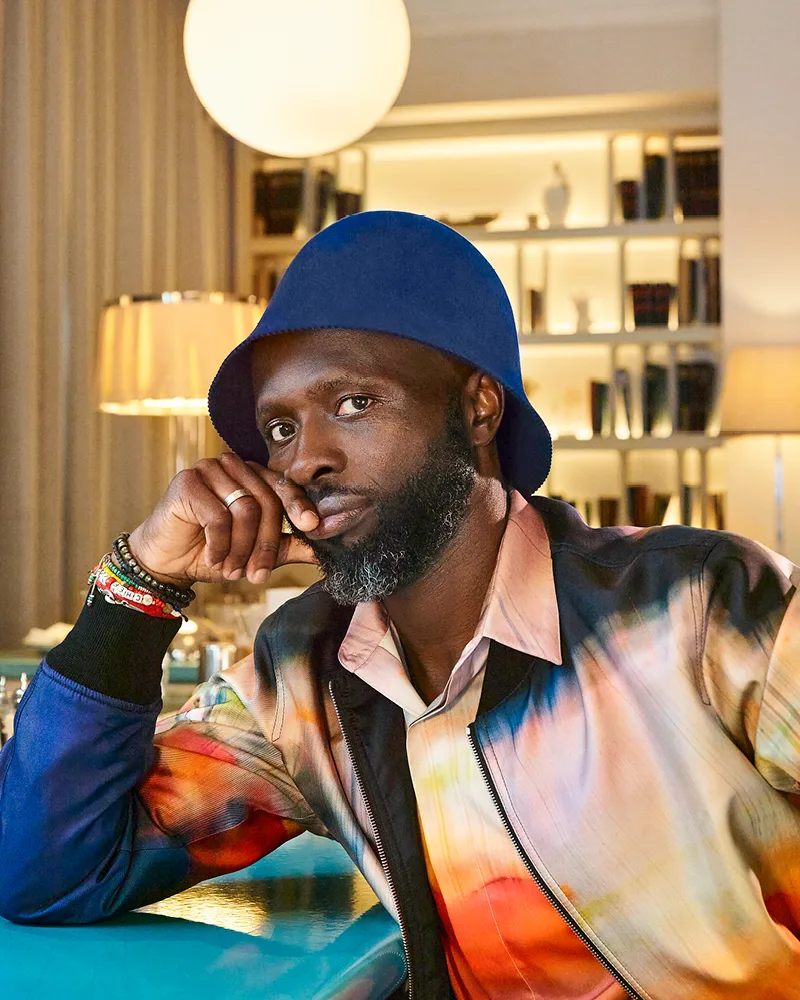
Following such a transformative experience in France, Ani was hoping that the same method would work in Spain. Hoping to expand his understanding of modern cooking techniques he offered his services to the world-famous restaurant, Mugaritz, in San Sebastián, but ultimately would come to realize that it was in simple classic flavours that his passion burned the brightest.
After briefly returning back to London and working on creating the menus at the French restaurant La Petite Maison, Ani was offered the role to head up the kitchen at the new branch in Dubai in 2009.
“I took the decision to move to Dubai with La Petite Maison because I wasn’t fearful about what was next,” says Ani, who played a pivotal part in the instant success of the restaurant which, along with the nearby Zuma, ignited a boom in high-end dining in Dubai that has not relented for more than a decade.
“It was a definite game-changer,” says Ani. “I remember before we opened, we were looking at the other main restaurants in town, like the Rivington Grill and Reflets, and nothing felt like you were eating the culture of the cuisine—it all seemed half-committed or imported. We wanted people to feel like they could taste the culture in the food, not just the recipes but by extracting the experience and telling each story from the source.”
“I remember when [La Petite Maison] opened we looked at the other main restaurants in town and nothing felt like you were eating the culture of the cuisine—it all seemed half-committed or imported.”
Despite—or arguably because of—the success of La Petite Maison, Ani would leave after falling out with the owners. Another lesson learned, and another value cemented. “I’m still someone that believes in the authenticity of a handshake agreement, even though it has burnt me many times in the past, my word is my contract.
It’s these episodes in your life that build your mental strength, and build you to be able to take the next step. You can either cry and play the victim, or you can stay positive and learn from it.” And learn from it he did.
***
Regardless of his British-Nigerian nationality, Izu Ani is often described in Dubai as being ‘homegrown’. It’s no secret that the city, and its rulers, have openly embraced the chef and even issued him a UAE Gold Card Visa earlier this year for his service and dedication to the emirate’s culinary scene.
That rare privilege is not due to the fact that members of the royal family regularly pop into Gaia for lunch, or that he has developed a friendship with the Crown Prince of Dubai HH Sheikh Hamdan bin Mohammed bin Rashid Al Maktoum, but because Ani shares the mindset and values of the progressive city he now calls home.
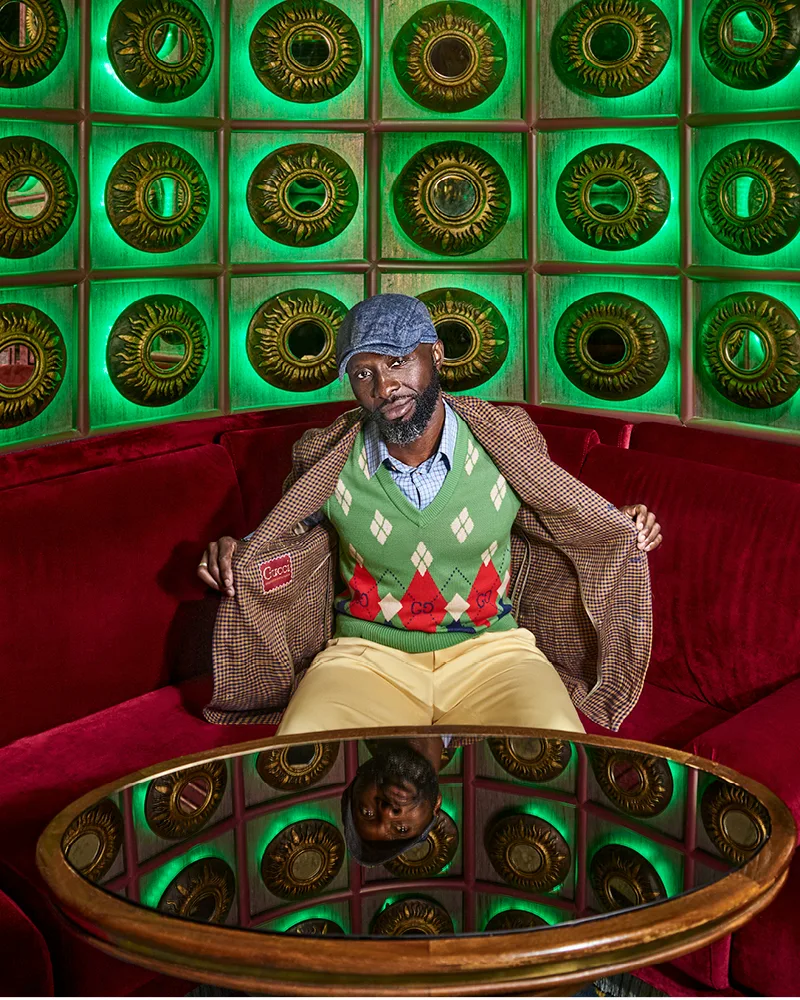
“Dubai has the mentality that everything is possible,” says Ani. “It’s a place that lives by the idea that if you can do it, why not do it today? In London, it takes years and years for anything to get done. In the time that people have been discussing opening up a third runway at Heathrow, Dubai has built two whole airports!” he says with a laugh, but the sentiment is serious.
After La Petite Maison, Ani genuinely considered taking his young family back to Europe. He was renting a car, renting a house, had a new-born son and no long-term plans. It was another pivotal moment in his life.
“Like most people, when I first moved to Dubai I had that same idea of stay for two years, save some money and move on. That kind of transient life where you don’t put any roots down, and you can leave as soon as the next gate opens,” explains Ani. “What ended up happening was that I started to change my perception of life. I realized that if you are always ready to move on, you never properly take the time to expand your knowledge and see where, and how, you can grow.”
“I realized that if you are always ready to move on, you never properly take the time to expand your knowledge and see where, and how, you can grow.”
Like the lemons earlier in the day, Ani again turns to nature as his metaphor. “For example, I don’t irrigate my olive trees,” he says referring to a huge plot of land he owns in Greece where he cultivates his own olive oil (he named the brand ‘Theo’ after his eldest son) to use in his restaurants. “As soon as you irrigate olive trees, they become lazy. You see, if you provide them regular water, the roots don’t need to go searching deep into the soil for that good sustenance to grow, and therefore they miss out on all the richness in nature, and that effects the quality. Us humans, if we never put roots down, we will never grow stronger.”
He explains that as soon as that mindset changed, both himself and Carine fully embraced the opportunity that a place like Dubai could offer. “Dubai enables us to see the world with the eyes of a child, to explore and build our dreams into our realities, and for that, I will always be grateful,” he says.
For Ani, one of those childhood dreams was his car. He had been renting a Toyota Yaris for the first few years in Dubai and, as a lover of fast cars, he hated it. “It just wasn’t me,” he explains. “It doesn’t represent the way I look at life. When I’m on the road, I have places to be and I don’t just want to get there quickly, I want to get there now!” he hit his hand on the table for emphasis, and bursts into that trademark laugh and beaming smile, before saying: “Now I drive an Audi R8. People say that is suits me much better.”
***
Today, through his agency, Ani oversees a restaurant empire. Alongside Gaia and Carine, his other restaurants include Izu Brasserie & Bakery, The Lighthouse, Sum+Things in Riyadh and Izu Restaurant at the Mandarin Oriental, Doha. There have been others that have not been as successful—notably, Aya in Dubai’s City Walk—and previous successes that he is no longer a part of (the aforementioned La Petite Maison and La Serre in Downtown Dubai). All of that is evidence that the man is not someone who enjoys sitting still.
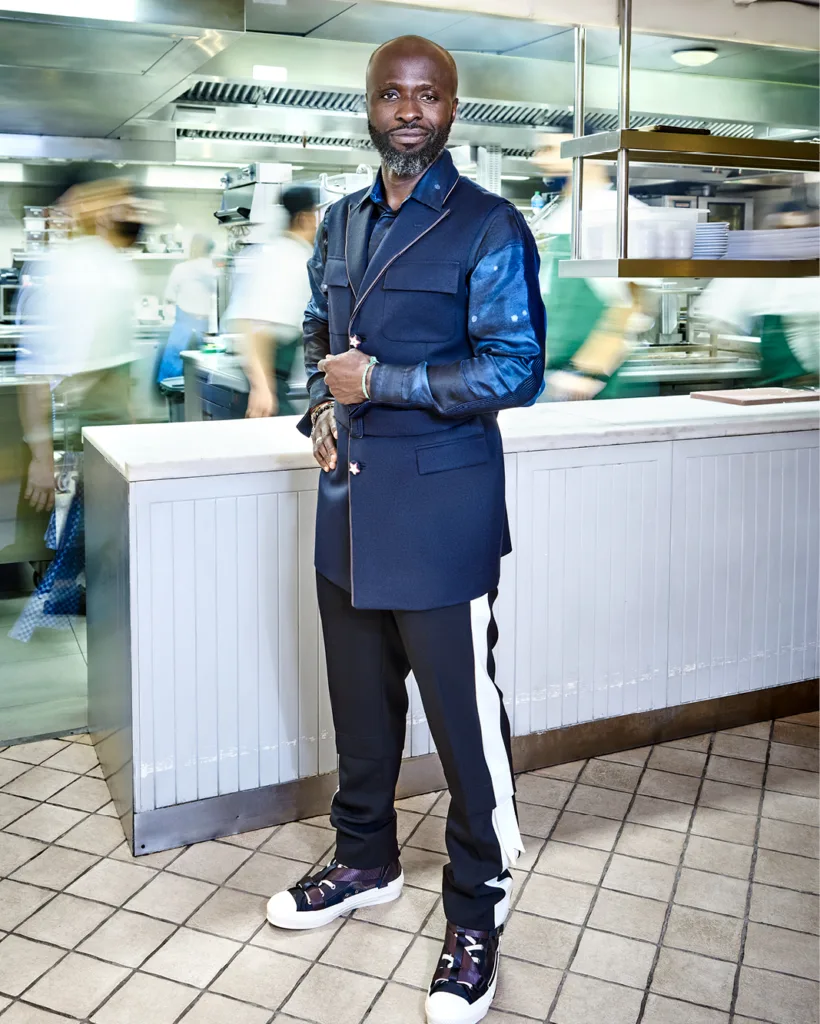
In a post-Covid world, the operation currently taking up most of his time is as ambitious as you would expect from Ani. Kitch-In is a new Dubai-based, delivery food platform created in collaboration with the Accor hotel group, and Ani’s regular business partner Evgeny Kuzin (CEO of Bulldozer Group, a hugely influential player in Dubai’s hospitality industry).
Built as a sort of a ‘cloud kitchen’ concept, the twist is that the multiple delivery-only restaurants operate exclusively from the network of the Accor group’s hotel kitchens. At the time of writing Kitch-In had launched 14 brands under its umbrella offering a huge spread of different cuisines including a Japanese street food from Jimoto; Korean cuisine from Seoul Sister; Italian delicacies from Gigi; Greek favourites from Ap’ola; and the rather self-explanatory Izu Burger.
Ani’s role in the operation is to work with the chefs on their menus, sourcing ingredients and ensuring quality, with the explicit goal to offer more health-conscious options to the market.
“I’m still someone that believes in the authenticity of a handshake agreement. Even though it has burnt me many times in the past, my word remains my contract.”
“For me, everything needs to be designed to fit the purpose,” says Ani. “During lockdown, I was getting pressure to start doing delivery from my restaurants because our competitors were getting involved. It’s wasn’t what I wanted to do at the time. Gaia, for example, is all about the in-person experience, and not about shoving food out to delivery drivers. I didn’t want to disturb that. I said that if we were going to explore delivery options then, let’s do it properly.”
In other markets the concept of cloud kitchens had been attracting serious interest from investors, so it seemed like a good place to start. According to Ani, ‘Kitchen Stories’ was the original name that they came up with, but ultimately, after a group-think with all the stakeholders, the name Kitch-In was chosen.
Regardless of the project, one of Izu’s central values is his uncompromising commitment to standards. With the delivery element being at the heart of the new business, he was equal parts intrigued and concerned. “I don’t want to do anything that doesn’t belong in my philosophy, which is about being honest and taking responsibility for things such as people’s health,” he says. “As cooks we are not here to entertain people. We are here to look after our customers’ health. That is our social responsibility. The idea of delivery-only restaurants didn’t sit well with me at first, because you don’t get to see where the food is being prepared from, or how clean the kitchen is. With Kitch-In it was vital for me to be able to add the standards that I demand from any kitchen I am involved in. This was why we were happy to work with the Accor Group and establish brand a new kitchen space they I could ensure met my standards and my philosophy.”
***
It’s clear that during the shoot at Gaia, that the showman within Ani is enjoying himself. While fashion might not be his wheelhouse —you rarely see him out of his self-imposed all-black ‘uniform’ of a tight t-shirt and jeans and his customary herringbone flat cap—he is excited to try everything on the clothing rail. “Not sure there’s enough space in those trousers for all of me, if you know what I mean!” he laughs with that customary arched eyebrow.
His demeanor is relaxed but with an excitable energy that far belies his 44 years. A fan of watches, he tells us that he wished he’d worn his newly delivered Rolex Daytona with a Panda dial. Instead we’ll have to settle for his Audemars Piguet Royal Oak Offshore. He laughs.
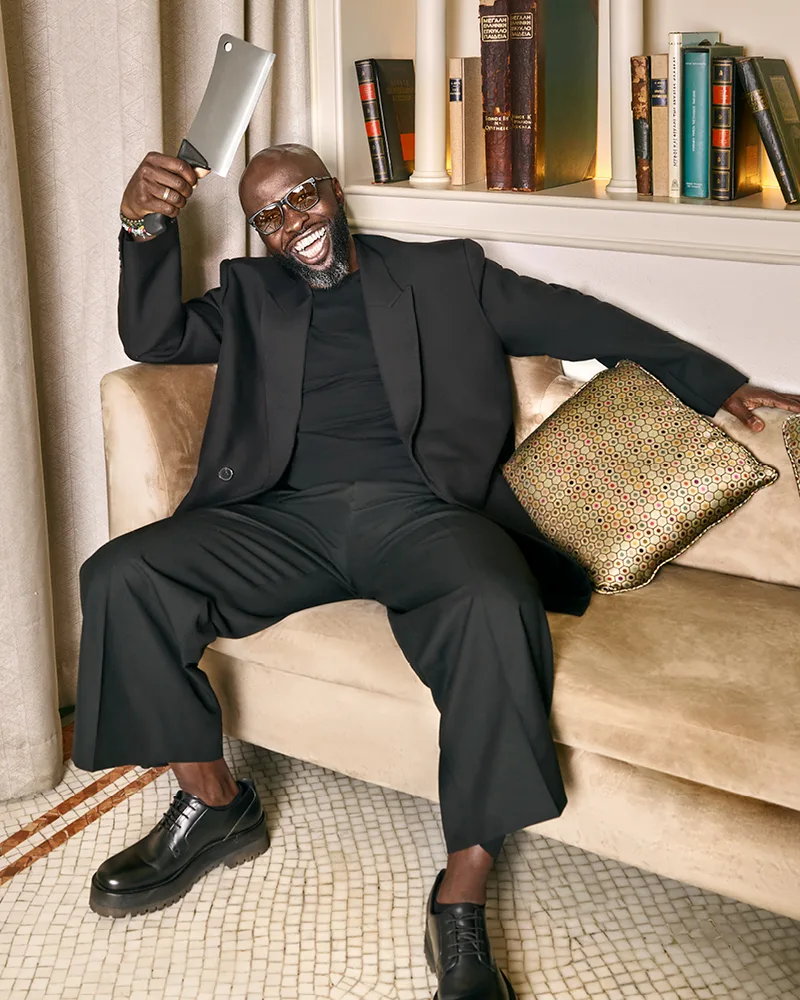
As the shoot breaks for lunch, there is an almost instant change in Ani manner. The restaurant has offered to cater for the crew with an almighty spread, and as Ani changes out of the Louis Vuitton and into his work uniform, he transitions from being our guest to being our host. “We are in his house now,” a member of his team leans over and whispers.
As the crew sits around the long wooden table that dominates the private Chef’s Table room downstairs in Gaia, a switch has flipped and Chef Izu comes to the fore. This is his comfort zone. He bounces around each person talking them through the dishes. Making sure the vegetarians have enough to eat. Making sure vegans are looked after. Asking the waiting staff to make another Greek salad, “hold the goat’s cheese”.
“To keep something you like, you have to let it grow. The more we grow the better we can become”
Lamb chops, roast chicken, prawns Saganaki, and the restaurant’s famed organic Greek sea bream carpaccio, served as a whole fish with the raw flesh pre-sliced and curled up into edible bites. He then begins to describe and demonstrate the best order in which to taste the trio of sauces—olive oil first, truffle oil second, bergamot and orange last. Again, it’s that balance of personality and learned wisdom that lies at the heart of Ani’s empire.
A real-life demonstration that he indeed practices what he preaches. In a previous conversation Ani described himself as a storyteller whose “language is food”. As someone who wants to keep exploring, and bring back the tools of his experience so that others can benefit from what he’s learned.
***
It’s almost inevitable that someone as ambitious as Ani would start to feel like a big fish in a small pond. Someone whose values and mindset constantly demand a push for better, bigger and bolder, will unlikely be satisfied with the geographical constraints—or any constraints for that matter.
While Dubai’s dining scene is dominated by the importing of established brands and splashing cash to entice named chefs to open up shop, there are very few examples of success being found the other way. Bolstered by his career’s hot streak—including expansions into both Riyadh and Doha—Ani has successfully managed to export Gaia into his old stomping grounds, firstly opening in Monaco last year, and now working on another branch slated for 2022 in London’s Piccadilly.
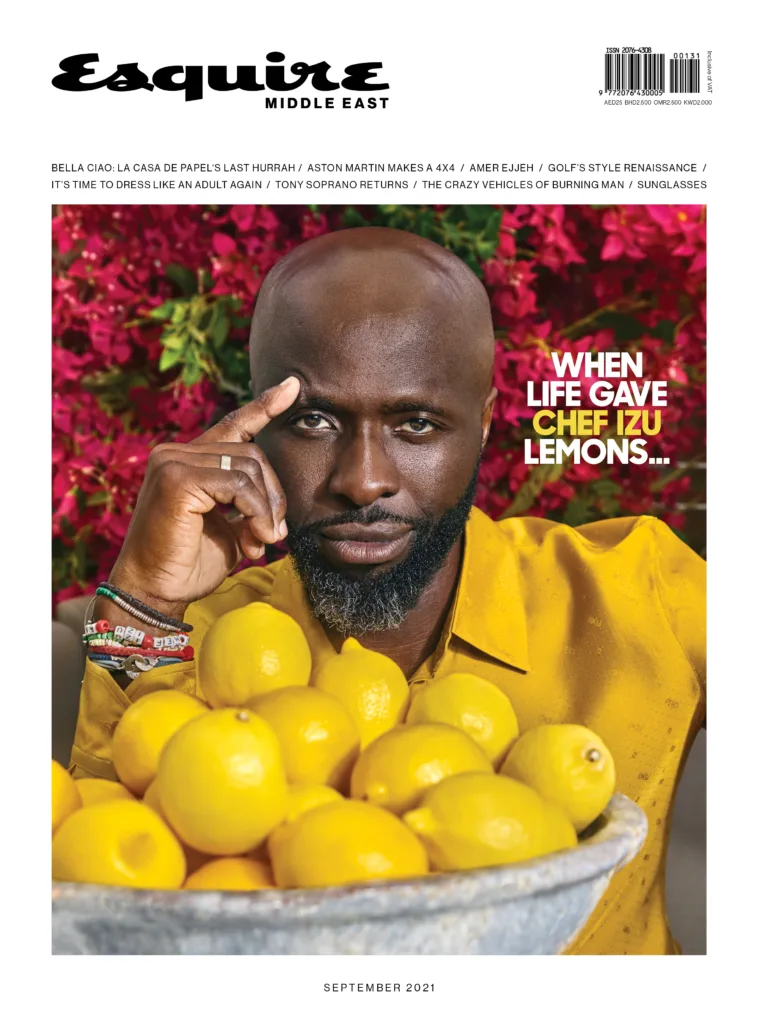
“I saw the location, the other week and it is immense! I was smiling like the Cheshire cat!” he says. As a ‘made man’ with a regional reputation enough to open any door, the question we have of him is: why take the risk by going global, where many others have failed?
He sighs, pauses and thinks about the answer, again turning to a metaphor in nature, well, actually two: “To be honest, to keep something you like, you have to grow it,” he says. “If you grow a small plant in a pot, and want to keep it longer, you need to eventually plant it in the ground. Because the more we grow, the better we can get. The way I see it is like swimming in a pond. Everything feels safe there, but actually the water is stagnant and it can breed bacteria. What life has taught me about myself is that I prefer to swim in a river or a sea—it might be a more dangerous and more unknown, but it is always moving and that’s where you keep growing.”




